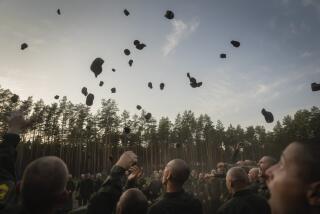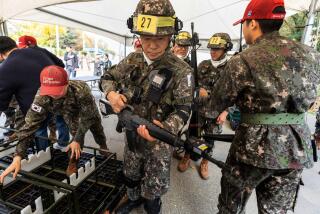Traditionally Neutral Swiss to Vote on Scrapping Army
- Share via
ZURICH, Switzerland — After a fierce national debate, Swiss citizens will vote this month on a proposal to abolish the army.
Surveys show the proposal has no chance of being adopted. But opposition to the army has grown, particularly among the young, and this worries the government, which urges rejection of the proposal.
“More than a third ‘yes’ votes would not be good,” Defense Minister Kaspar Villiger said in a magazine interview.
The government fears that such a result would harm neutral Switzerland’s international image and cast doubt on its readiness to defend itself.
The proposal has come from the “Group for a Switzerland Without an Army,” a coalition of pacifists, ecologists, religious groups, and left-wing political bodies.
It collected 111,300 signatures in 1986, and under Switzerland’s unique system of direct democracy was able to force the government to hold the Nov. 26 referendum.
The group argues that Switzerland, which kept out of World War II, could not survive a modern European war and it should set an example of disarmament for the rest of the world.
“We would like to see the money and human talent which goes into the army directed at curing the causes of war, not the symptoms,” the group’s leader, Andreas Gross, says.
An opinion poll published in the weekly Schweizer Illustrierte on Oct. 30 showed only 27% of Swiss favored abolishing the army. While older age groups overwhelmingly supported the army, 43% of those between 20 and 29 wanted it scrapped.
None of the major political parties backs the initiative. The Radical Democrats, Christian Democrats and Center Democrats urge its rejection. The Socialists are split on the issue and have advised members to follow their consciences.
The proposal has aroused strong emotions, even though the Swiss have not fought a battle since they were beaten by a French army under Francois I in 1515 at Marignano, in what is now Italy.
The reason is that the army plays a vital role in the Swiss way of life and is often said to be the only unifying force in a country riven by linguistic, religious and geographical differences.
For many men, the only time they ever meet compatriots of a different language or region is in the army.
The army is a militia based on universal service. Young men are conscripted at 20 to undergo 17 weeks of basic training and, if they remain privates, have to serve another 210 days spread over the next 30 years. Officers serve longer. Every soldier keeps his rifle and uniform at home.
Some critics say the army might as well be abolished because it would stand no chance against what Swiss military manuals regard as the likeliest threat, a Soviet attack.
Others say war is unlikely at a time of glasnost and growing liberalization in Eastern Europe.
The government sees things differently.
In a leaflet sent to all voters, it says times of change are also times of uncertainty and points out that disarmament negotiations have not yet yielded concrete results.
It argues that Switzerland’s neutrality has to be defended and adds: “The arms race continues and weapons arsenals in Europe have never been so big.”
With 625,000 men, or almost 10% of the population, the army reaches deep into civilian society and is probably more vulnerable to criticism than a professional army would be, as everyone has his own ideas about its role.
Probably its most eloquent critic is 78-year-old novelist and dramatist Max Frisch, who took up his pen again last spring for the first time in seven years to write a pithy 86-page dialogue in which an old man and his grandson discuss the army.
The old man describes the army as “folklore” and the “bodyguard of the bourgeoisie.”
He says to his grandson: “Why do we need the Cold War? If there were genuine peace and the clear picture we have of the enemy were to fade, the billions approved for defense spending would be put in jeopardy.”
He goes on: “That is why our army chiefs don’t believe in peace research. Their thinking is realistic--not world peace but only the lack of war saves the Swiss army from abolition.”
The book, “Switzerland Without an Army? A Palaver,” was published in June and has become the country’s top-selling nonfiction work. It has also been dramatized and is playing to packed houses in Zurich.
Many who will vote to abolish the army say what they really want is to tell the government to cut its defense spending, currently running at $3.1 billion a year.
But the Defense Ministry says defense spending as a proportion of total government expenditure has fallen steadily and is now only 1.8% of gross domestic product, well behind West Germany’s 3.1% or the United States’ 6.4%.
To keep costs down, military hardware is kept going long after other countries have scrapped or lost similar equipment in battle.
Field guns dating from 1943 and Hunter fighters built in 1958 are still in service, and 34 F-18 McDonnell Douglas fighter planes that the government wants to order in 1990 will be expected to last 30 years.
More to Read
Sign up for Essential California
The most important California stories and recommendations in your inbox every morning.
You may occasionally receive promotional content from the Los Angeles Times.









